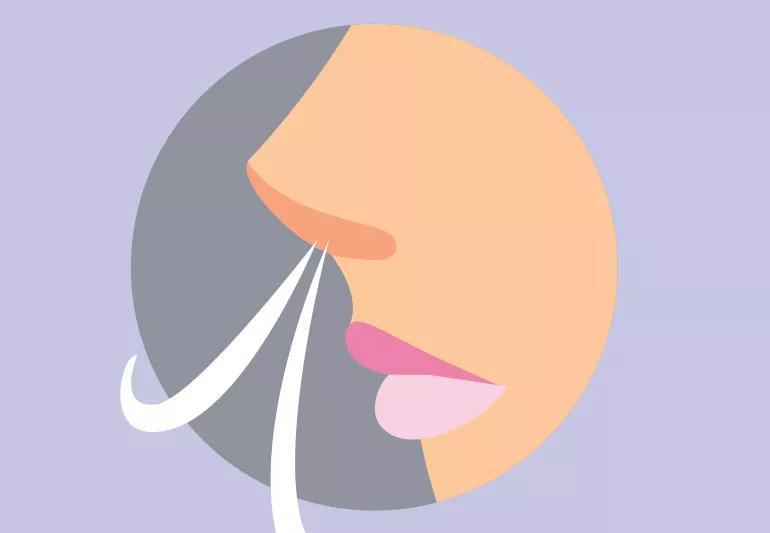Many people don't know they have the problem

When you close your mouth and take a deep breath does the air flow easily through both sides of your nose? Or is your nose making it harder for you to breathe freely?
Advertisement
Cleveland Clinic is a non-profit academic medical center. Advertising on our site helps support our mission. We do not endorse non-Cleveland Clinic products or services. Policy
A surprising number of people — more than one-third of the population — are unknowingly living with a deviated septum. That means the cartilage that divides the nasal passage is crooked or uneven, making one side narrower than the other.
But not everyone who has a deviated septum requires intervention for it. Many people have no symptoms.
However, for some people, this condition can make illnesses more severe and cause other problems as well, says head and neck specialist Kyra Osborne, MD.
You can have a deviated septum for a number of reasons, she says.
“If you’ve broken your nose or had any sort of trauma to the face, you can develop a deviated septum,” she says. “In many cases, people don’t even know they’ve broken their nose or had a serious enough injury. But it can also happen from birth — just from the pressure of the birth canal. The cartilage may grow in a crooked manner.”
There are several problems you can experience if you have a deviated septum. It can cause other conditions or make certain illnesses worse. Here are the five most common issues:
Advertisement
Whether you’ve had your deviated septum from birth or developed one after a face or nose injury, your doctor likely can diagnose the problem with a physical exam.
A nasal steroid spray can sometimes correct the issue, Dr. Osborne says. If not, you may need surgery to straighten the septum. (It’s typically an outpatient procedure.)
If snoring is your main issue, there may be an even simpler fix. “In some cases, sleeping with the head of the bed elevated can help alleviate some snoring,” she says.
It’s a good idea to consult with your doctor if you suspect you have a deviated septum. Even if you end up needing surgery to correct the problem, it’s worth it. Once your nose heals, it will no longer work against you when you take a deep breath. And you may leave a whole host of other problems behind as well.
Advertisement
Learn more about our editorial process.
Advertisement

If your nose is constantly running, it could be allergies, chronic sinusitis, nasal polyps or other concerns

Allergies, indigestion and the effects of gravity can all mess with your nose at night

These growths inside the nose don’t cause cancer, but it’s important to make sure you get a proper diagnosis

Avoid irritants and allergens, run a humidifier, try saline rinses and ask a healthcare provider about medications

Staying calm, sitting up straight and gently pinching the sides of your nostrils can help a bloody nose go away faster

Dry air, allergies or nose-picking may be to blame for nighttime epistaxis

Take care of your runny or stuffy nose by staying hydrated, using a humidifier and considering a medication

Allergies, acid reflux and even pregnancy can increase drainage and upset your stomach

Start having sex about 72 hours before ovulation, then at least every other day during your fertile window

Attachment theory suggests that your earliest relationships shape connections throughout your life

It isn’t a recognized mental health disorder, but research shows that problematic social media use can negatively affect your mental health, self-esteem and sleep